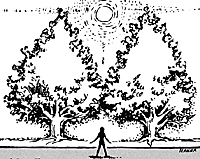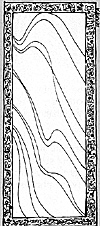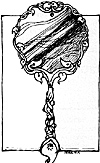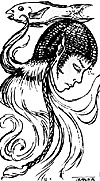 Moon Tree and Sun Tree
Moon Tree and Sun Tree
Will answer accurately one question each; Moon Tree answers at moonrise, Sun Tree answers at sunrise. Each tree will answer only one question per day. Each tree will answer only one question per character ever.
Moon Tree and Sun Tree are reported in legends and by two famous historical personages, though the accuracy of neither is beyond reproach. Alexander the Great told Aristotle of the Moon Tree and the Sun Tree that grew near each other on a cleared hill in India. The trees spoke both Indian and Greek and would answer one question each from proper supplicants. (Gamemaster's (GM) note: if the question can be answered factually then do so; the answer is public to anyone within 50 feet who understands the language. If the answer is uncertain or involves the far future, simply take a guess-let the questioner beware.) Rules for asking the questions involved chastity for the preceding week and approaching totally naked, without any rings, jewelry, or weapons. The Sun Tree answers at sunrise, and the Moon Tree answers at moonrise. The existence of these trees was also mentioned by Marco Polo, who said that he had seen them.
Appearance: They are a type of laurel tree. The Moon Tree has white bark with silver leaves, while the Sun Tree has tan bark with yellowgold leaves.
Value: Donations of 100 gold pieces or more to the poor native village nearby are said to propitiate the trees; for additional sums, translators of Indian into the Common language can be found.
 Mirrors of Body Trapping
Mirrors of Body Trapping
A being which sees itself in one of these mirrors must make a saving throw as if against petrification or be trapped inside the mirror. Captured beings are released only by breaking the mirror from the outside with a glass mallet.
Mirrors of Body Trapping, according to Chinese mythology, belonged to the Yellow Emperor, who used the magical mirrors against his enemies. Any living being which sees itself in one of these mirrors must take a saving throw as if against pertrification. If the saving throw fails, the being suddenly finds himself inside the mirror looking out, trapped in a timeless limbo where no action save thought is possible. Nothing a captured mortal can do from the inside will have any effect, and any character so captured cannot communicate with the rest of the party. A successful saving throw will only protect a character for one glance or round, and means the character's eyes were averted in time.
If the character looks at or makes any attack on the mirror, he must save again for each such attempt.
The mirrors are totally impervious to any kind of physical or magical attack except one: a mirror may be shattered by a mallet made of solid glass. When a mirror is so shattered, all beings held within are released. Dice are rolled to see how many previous beings are released and their probable reaction and attitude. Roll ID10 for number and type of beings, then roll ID100 for each being to determine mental state and reaction.
Appearance: These mirrors (at least 12 are reported) are rectangular and full length, about 18 inches wide and 5 feet long. They are framed by gilded wood encrusted with pearls and white jade.
Value: 100,000 gold pieces.
Number & Type of Beings Released
- 1D10 Roll Result
1 2 Fighters, 2 Government Officials
2 2 Fighters, 2 Magic-Users, 1 Level 1 Monster
3 2 Rangers, 1 Magic-User, 1 Cleric, 1 Level 2 Monster
4 4 Fighters, 2 Clerics, 1 Level 3 Monster
5 3 Fighters, 1 Illusionist, 1 Druid, 2 Level 2 Monsters
6 3 Rangers, 1 Monk, 1 Bard, 2 Level 3 Monsters
7 2 Fighters, 2 Thieves, 1 Assassin, 3 Level 2 Monsters
8 2 Assassins, 2 Monks, 1 Cleric, 1 Level 4 Monster
9 2 Thieves, 2 Magic-Users, 1 Level 4 Monster, 3 Level 2 Monsters
0 1 Thief, 2 Assassins, 2 Level 4 Monsters, 2 Level 2 Monsters
Attitude/Reaction of Released Beings 1D100 Roll Result
01-10: Favorable: Grateful for release.
11-25: Neutral: Will not make unprovoked attack.
26-75: Usual Reaction: This will depend upon alignment, attitude, etc. The usual reaction of a
monster is to attack, for example, unless it is outnumbered and is intelligent enough to realize this.
76-90: Hostile: Will attack anyone present, believing them to be involved in its imprisonment.
91-00: Insane: The imprisonment in limbo has dangerously disordered its mind. This will result in 50% neutral reaction and 50% violent reaction; the reaction can shift every round. Violent response will even include attacking those of like alignment.
 Mustard Seeds
Mustard Seeds
Potion allows + 2 (+ 10%) bonus to saving throw vs. poisons for a period of one hour.
Mustard and mustard seeds have been regarded since the Hellenistic era as having special curative powers, most frequently as a device to increase one's resistance to poisons. Mustard seeds were prized so highly that Aesculapius was said to have discovered them.
When mustard seeds are correctly decocted in wine, a potion is formed that enables one who drinks it to have an increased resistance to poisons of all types for a period of one hour. It is said to confer immunity from scorpion poison. The resistance is described by a + 2 (+ 10%) bonus to any saving throw against poison during the period of effect.
One pound of mustard seeds is necessary to make one dose (about one cup) of the magical potion. The restrictions on making the decoction are such that only one dose can be prepared per week.
Appearance: Mustard seeds are quite small and are recognizable to most characters. Preparing the potion correctly requires the skill of an apothecary or herbalist.
Value: 50 gold pieces per pound of seed. 1,000 gold pieces per dose of potion.
 Mirror of al-Asnam
Mirror of al-Asnam
Comes from The Thousand Nights and a Night, and was a gift from the King of the Djinn to Prince Zayn alAsnam. Its original purpose was to indicate whether the bride the Prince was to obtain for the djinni was chaste, but al-Asnarn discovered that it could be used as a lie-detector and with its help became renowned as a wise judge.
The image of the subject must be caught and reflected in the mirror as he answers the question. If the subject is being less than truthful, the glass will grow cloudy and dark; the greater the extent of the untruth, the darker the glass will grow. This cloudiness will remain for about 10 seconds, after which the mirror will clear and be able to respond again. Note that if the subject gives an answer which he believes to be the truth, the mirror will remain clear and show no change even though the statement may be contrary to fact.
Appearance: A circular hand mirror about eight inches in diameter, with a tapering handle 8 to 10 inches long. The frame and handle are made of ivory encrusted with fiery opals.
Value: 17,000 gold pieces.
 Memaid's Cap
Memaid's Cap
Allows wearer to breathe underwater. Capture of the cap prevents mermaid from escaping.
Mermaid's Cap, called cohuleen diluth in Irish Gaelic, is the key to keeping a mermaid from evading capture. Wearing the cap allows a character to breathe water normally as if it were air, with no physical manifestations such as gills. Mer-folk relentlessly track down any stolen items and can assume human form on land. The few caps that have come into the possession of humans are washed up after a violent storm.
In Slavic areas the mer-folk, called Vodyanoi, can have horns, paws, and tails; be covered with grass or moss and have red eyes; be old men with green hair and green beards. Mer-folk grow older and younger with the phases of the moon and live in underwater crystal palaces ornamented with gold and silver from sunken ships. An adventure in their realm would have both the potential for great profit and for disaster.
Appearance: The caps are like bathing caps or skullcaps in shape, but are made of many small pearls strung together.
Value: 25,000 gold pieces.
Fantastic Treasures, copyright @ 1985, is a publication of Mayfair Games Inc.'s Role Aids line. Artwork by Teanna Byerts and text by Al Hammack. Fantastic Treasures is used with permission from Mayfair Games Inc.
Back to Table of Contents -- Game News #7
To Game News List of Issues
To MagWeb Master Magazine List
© Copyright 1985 by Dana Lombardy.
This article appears in MagWeb (Magazine Web) on the Internet World Wide Web.
Other military history articles and gaming articles are available at http://www.magweb.com